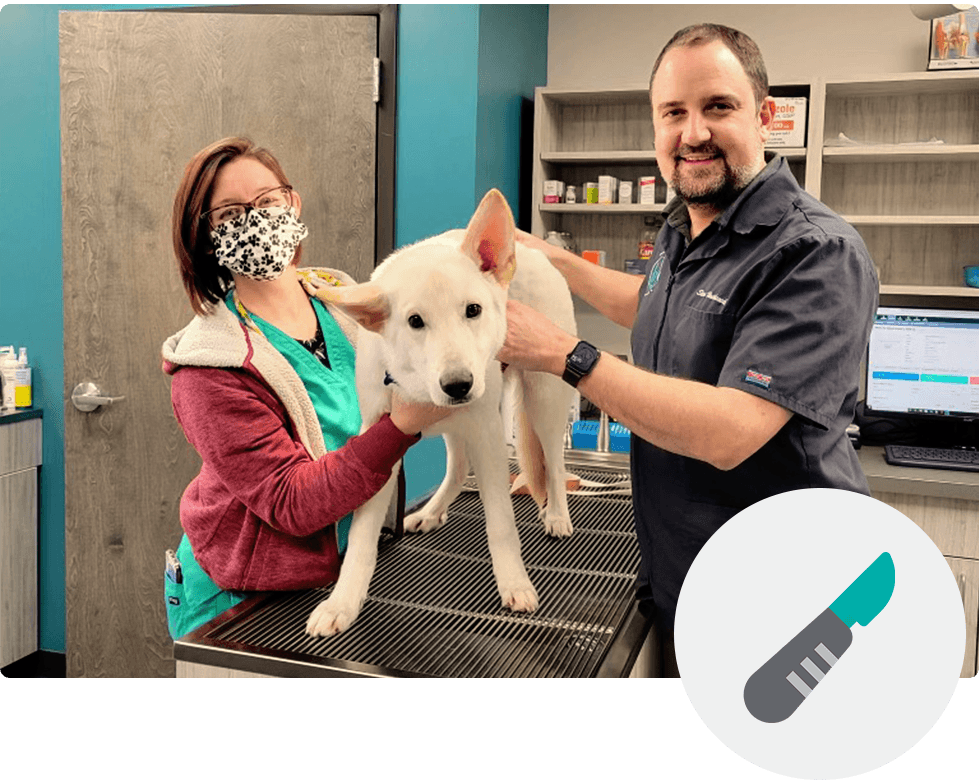
The thought of sending your beloved companion in for surgery can be frightening — even when it’s a routine procedure like a spay or neuter.



If your precious pet requires a surgical procedure not mentioned above, we encourage you to contact us, as this is a partial list. We are equipped to perform soft-tissue pet surgeries in-house and will gladly help your dog or cat if we can perform their specific surgical procedure.
Our Surgery Process
Our veterinarians carefully examine all patients prior to pet surgery. We also perform pre-anesthetic bloodwork to make sure the kidneys and liver are functioning properly and that your pet is healthy enough to undergo anesthesia. Our team will closely monitor your pet’s vital signs throughout their operation, and we will keep a close eye on them while they are in recovery. Your pet’s comfort and safety will always be our primary concerns before, during, and after their surgery. We will also provide detailed aftercare instructions and encourage you to contact us immediately if you have any concerns or questions during your pet’s recovery.

Is anesthesia safe for cats and dogs?
Yes, anesthesia is safe for pets. We perform pre-anesthetic bloodwork to make sure your pet is healthy enough for anesthesia. Our team closely monitors your pet’s vital signs throughout the procedure for their safety.
How should I prepare my pet for surgery?
Follow the pre-surgical instructions provided by our team, which will include fasting before the procedure. If you have any questions about the pet surgery instructions, ask us!
Will my pet be in pain after surgery?
Our team will provide pain management before, during, and after surgery for your pet’s comfort. We also give detailed aftercare instructions, including pain relief measures such as medication, to help manage your pet’s recovery at home.
How long is recovery after pet surgery?
Recovery times vary depending on the pet surgery performed. We will provide you with specific aftercare instructions and are available to answer any questions or concerns you may have during the recovery period.
When should I contact the vet during my pet’s recovery?
You should contact us if you notice any signs of infection (redness, swelling, or discharge at the incision site), persistent vomiting or diarrhea, loss of appetite, excessive lethargy, difficulty breathing, or other unusual behaviors. It’s always better to reach out if you are unsure about your pet’s condition.
If your precious pet requires a surgical procedure not mentioned above, we encourage you to contact us, as this is a partial list. We are equipped to perform soft-tissue pet surgeries in-house and will gladly help your dog or cat if we can perform their specific surgical procedure.
Our Surgery Process
Our veterinarians carefully examine all patients prior to pet surgery. We also perform pre-anesthetic bloodwork to make sure the kidneys and liver are functioning properly and that your pet is healthy enough to undergo anesthesia. Our team will closely monitor your pet’s vital signs throughout their operation, and we will keep a close eye on them while they are in recovery. Your pet’s comfort and safety will always be our primary concerns before, during, and after their surgery. We will also provide detailed aftercare instructions and encourage you to contact us immediately if you have any concerns or questions during your pet’s recovery.